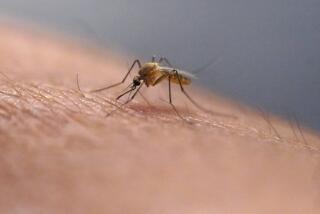Outbreak shows a dark side of Rio
- Share via
RIO DE JANEIRO — Brazil is booming. The currency is soaring, people are buying houses and cars at a record pace, and global financiers are keen to invest. The country seems poised to acquire official First World status.
But residents of this self-proclaimed city of wonders are worried and angry about a Third World affliction -- dengue fever, the tropical disease spreading in epidemic fashion here.
As of Friday, health officials reported that dengue had killed at least 87 people in the state of Rio de Janeiro this year and sickened more than 93,000. Most cases occurred here in the city, Brazil’s principal tourist attraction. Children 15 and younger have been especially hard hit, accounting for almost half of the dead, officials said.
Dengue has become an annual scourge in a swath of tropical Brazil, but this year’s epidemic seems likely to be Rio’s deadliest in recent history.
Rather than blame the stripe-bellied Aedes aegypti mosquito that spreads the ailment, many Cariocas, as Rio residents are known, are lashing out at what they call a confused and belated government response. Critics say officials were slow to fumigate and take other action during the Southern Hemisphere summer, when heavy rains created optimum mosquito breeding grounds.
“This epidemic is purely the responsibility of local and national authorities,” said Edna Rollin, 58, a history teacher who expressed the sentiment of many interviewed in the bustling Cinelandia plaza downtown. “They stopped fumigating in summer, and now we are paying the consequences.”
Lawmakers have pointed fingers at each other in a blame game reminiscent of what happened in New Orleans with Hurricane Katrina -- which also hit the poor hardest and exposed a dark underside of an international tourist mecca.
With the number of cases soaring and clinics overwhelmed, officials this month belatedly directed more than 1,000 soldiers to join firefighters, volunteers and others in patrolling streets and inspecting tens of thousands of homes in a much-publicized offensive. The teams fumigate and destroy stands of still water, where mosquitoes breed.
Anti-dengue squads are focusing on the poor hillside favelas where many live in close quarters amid substandard sanitary conditions. Declared Rio Gov. Sergio Cabral, “We must fight dengue in the same way we cannot tolerate the occupation of favelas by drug traffickers.”
The dengue epidemic, like the gun battles pitting police against traffickers in the favelas, has become a nasty blemish on Rio’s glam image. Some accuse the government of trying to keep a lid on dengue to avoid scaring off tourists.
There have been scattered reports of reduced hotel occupancy rates, but no mass cancellations. At major hotels, the international airport or at approaches to tourist icons such as Corcovado and Sugar Loaf mountains, few signs warn visitors of the dengue threat.
But word is out. The U.S. and other embassies have advised visitors to take precautions, such as wearing long-sleeved shirts and avoiding short pants.
The heated dengue debate has again bared the deep divisions between Rio’s haves and have-nots in a nation famous for income inequality. Residents of poor neighborhoods complain they have been ignored, until recently.
“I’m terrified that my baby will get sick,” said Graciela Kauan, 16, her 8-month-old son in her arms at the Cinelandia plaza. “I cover my boy with insect repellent each night and he sleeps under a mosquito net.”
Dengue fever, a viral disease transmitted by mosquitoes, is a flu-like ailment that is usually not fatal. However, physicians worry that a deadlier variant may be spreading here and in neighboring Paraguay, which also faces a dengue crisis.
There is no vaccine for dengue. Treatment usually involves rest and increased intake of fluids.
According to the Pan American Health Organization, dengue-infected mosquitoes have spread in the tropics worldwide thanks to factors such as rapid urbanization, lack of sanitation, and the heightened use of containers and tarpaulins made of plastic, which may provide breeding grounds for mosquitoes. Some experts say climate change also may have favored the dengue-carrying mosquito.
Although they say the epidemic has probably peaked, officials add that cases are unlikely to end until June or July and the arrival of cooler, drier weather.
Health experts hope that the outbreak will prompt earlier intervention in future years.
“There was evidence of an epidemic risk long ago,” Luiz Pinguelli Rosa, an expert at the Federal University of Rio de Janeiro, told Agencia Brasil news service. “If the recent measures had been taken two months earlier, the situation would certainly have been better, both in fighting the mosquito and taking care of those infected.”
--
D’Alessandro reported from Rio de Janeiro and McDonnell from Buenos Aires. Special correspondent Marcelo Soares in Sao Paulo contributed to this report.
More to Read
Sign up for Essential California
The most important California stories and recommendations in your inbox every morning.
You may occasionally receive promotional content from the Los Angeles Times.













